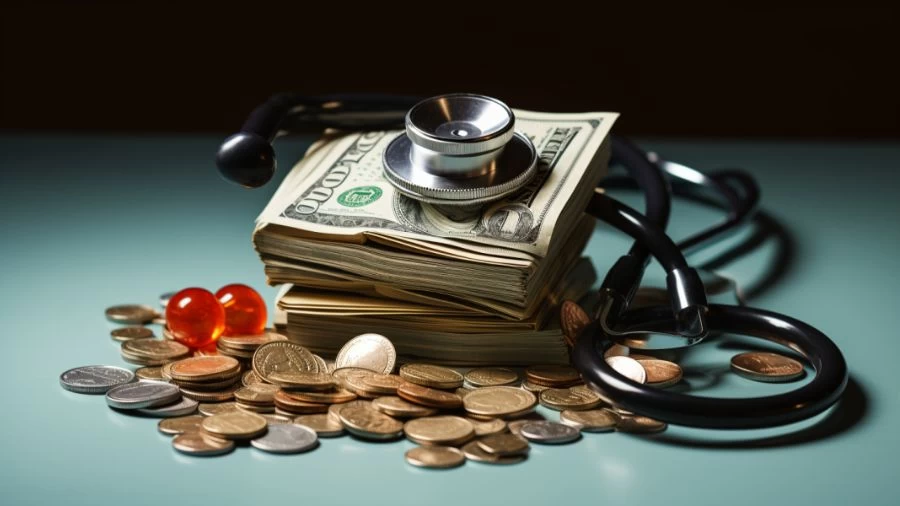
Why is Healthcare So Expensive? Understanding the Reasons
Healthcare in the United States is expensive due to a complex system with multiple insurance types, rising drug costs, higher salaries for medical professionals, profit-driven hospitals, defensive medical practices, and varying prices for medical services.
by Kowsalya
Published Aug 07, 2023 | Updated Dec 19, 2023 | 📖 5 min read
Why is Healthcare So Expensive?
Healthcare in the United States is characterized by a multitude of factors contributing to its high costs. The complexity of the healthcare system, marked by various insurance types with distinct rules and billing requirements, necessitates significant administrative expenses.
Americans pay nearly four times more for pharmaceutical drugs than citizens of other developed countries, mainly due to unregulated pricing and the inability of Medicare to negotiate drug costs.
Moreover, healthcare professionals in the U.S., including doctors and nurses, command higher salaries compared to their counterparts in other industrialized nations. Profit-driven hospitals further contribute to the overall expenditure, constituting 31% of the nation's healthcare costs.
Defensive medical practices, such as ordering costly tests as a precaution against lawsuits, and the absence of standardized prices for medical services also contribute to the escalating expenses. Additionally, the lack of a universal healthcare system and government intervention in controlling costs differentiates the U.S. from other developed countries, where healthcare expenditures are more efficiently managed.
What Are the Reasons Healthcare is So Expensive in the U.S.?
Healthcare in the United States is known for its high costs, and there are several key factors contributing to the expense of healthcare in the U.S. These reasons include:
Multiple Healthcare Systems
The U.S. healthcare system is highly complex, with various forms of health insurance, including employer-based, private insurance, and government-provided plans like Medicaid and Medicare. Each type of insurance comes with its own rules, funding, enrollment dates, and out-of-pocket costs. This complexity results in higher administrative costs, as providers must navigate myriad regulations for billing and coding.
Rising Drug Costs
Americans pay significantly more for pharmaceutical drugs compared to citizens in other developed countries. In the U.S., drug prices are not as regulated as in Europe, where they are often based on clinical benefit. Private insurers in the U.S. negotiate drug prices with manufacturers, but Medicare is not allowed to do so, contributing to higher drug costs.
Higher Salaries for Medical Professionals
Medical professionals in the U.S., such as doctors and nurses, earn higher salaries than their counterparts in other developed countries. For example, the average annual salary for a family doctor in the U.S. is much higher than in countries like Belgium, Finland, and the Netherlands.
Profit-Driven Hospitals
Hospital care accounts for a significant portion of healthcare costs in the U.S. Prices for inpatient services, such as surgeries and treatments, tend to be higher in the U.S. compared to other countries.
Defensive Medical Practices
To avoid potential lawsuits, physicians and hospitals in the U.S. may order more tests and scans than necessary. These additional tests can drive up healthcare costs.
Varying Healthcare Prices
The lack of standardized prices for medical services in the U.S. allows providers to charge varying amounts for the same services. The price for a specific healthcare service can differ significantly based on factors such as the type of insurance, government programs, and geographical location.
When Did Healthcare Become Expensive in the US?
Healthcare in the United States became increasingly expensive starting in the 1960s. This rising cost can be attributed to two main factors: government policy and lifestyle changes. The government implemented programs like Medicare and Medicaid to provide healthcare access to those without private insurance.
While this was a significant step towards improving healthcare accessibility, it also spurred increased demand for healthcare services, which in turn allowed providers to raise prices.
Additionally, the prevalence of preventable chronic diseases, such as diabetes and heart disease, has significantly contributed to the escalating healthcare costs. The treatment of these chronic conditions is not only expensive but also challenging.
As of 2020, those with at least one chronic condition accounted for 86% of healthcare spending. The high cost of treating these illnesses and the associated complications added to the overall healthcare expenditure.
MarketsHost invites you to uncover a plenty of articles, guides, and analyses that provide invaluable insights into the realm of Finance.
What Type of Healthcare System Does the United States Have?
The United States has a complex and mixed healthcare system that lacks universal coverage. Unlike many developed nations, it does not provide its citizens with universal healthcare. Instead, the majority of Americans rely on private health insurance provided by employers or through healthcare exchanges. Some individuals have access to public plans subsidized by the government, such as Medicaid for lower-income individuals and Medicare for retirees and those with certain disabilities.
The U.S. healthcare system is characterized by its fragmented nature, involving separate rules, funding, and enrollment dates for various forms of health insurance, contributing to administrative complexities and high overall costs. The absence of a unified, government-controlled system and the influence of market forces on drug and healthcare prices further contribute to the challenges and expenses within the U.S. healthcare landscape.
Why is Healthcare So Expensive - FAQs
1. Why is healthcare so expensive in the United States?
Healthcare costs are high due to complex systems, unregulated drug prices, high salaries for medical professionals, profit-driven hospitals, and defensive medical practices.
2. How much did the U.S. spend on healthcare in 2021?
In 2021, the U.S. healthcare spending reached $4.3 trillion, averaging about $12,900 per person.
3. How much do healthcare costs increase annually in the U.S.?
Healthcare costs in the U.S. are rising by approximately 4.5% annually, according to the American Medical Association (AMA).
4. What contributes to the high cost of prescription drugs in the U.S.?
Factors contributing to high drug prices include lack of government regulation, restrictions on Medicare's ability to negotiate prices, and questionable market practices.
5. How can healthcare costs be reduced and made more affordable?
Potential solutions include drug price regulation, addressing inefficiencies, promoting transparency, exploring targeted savings measures, and studying the adoption of Medicare's payment structure.




